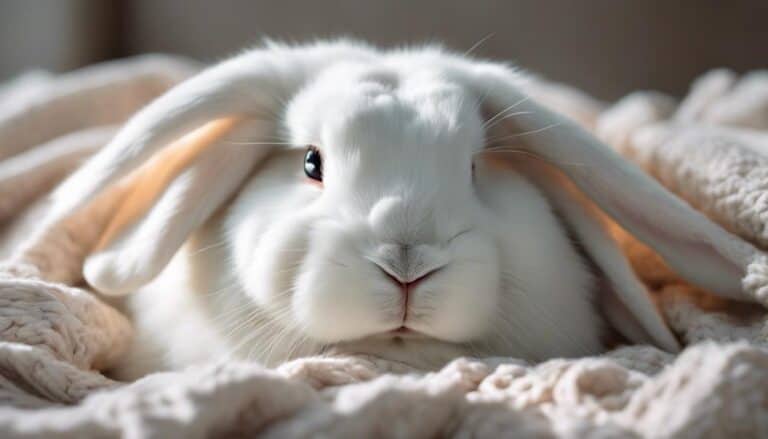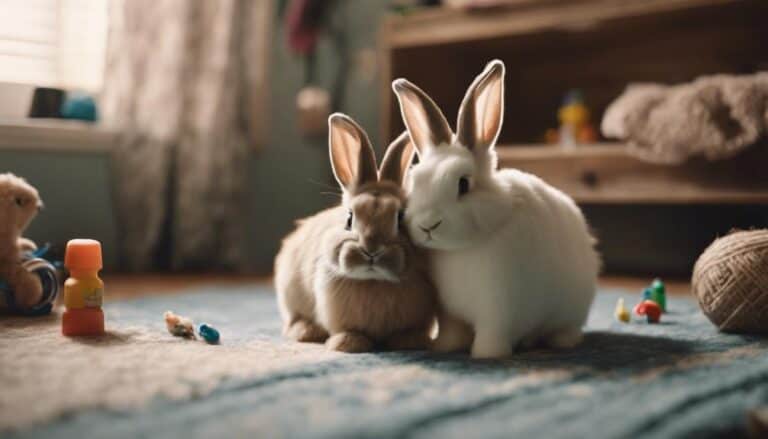So you're thinking of getting a rabbit to brighten up your apartment? That's a great idea!
Rabbits can make wonderful pets, but before you bring one home, there are some important things to consider. Their dietary needs, space requirements, and socialization habits must be taken into account to ensure a happy and healthy life for your new companion. Many people fondly recall their experiences with rabbits as beloved past pets, highlighting their gentle nature and unique personalities. By understanding these aspects, you can create a nurturing environment that honors the legacy of rabbits as cherished family members.
First of all, rabbits need exercise. They love to hop around and play, so you'll need to make sure you have enough space in your apartment for them to do so.
You'll also need to provide a safe environment for your rabbit, which means rabbit-proofing your home. Rabbits love to chew, so you'll need to protect your furniture and electrical cords from those curious teeth.
Taking care of a rabbit's health is also crucial. You'll need to monitor their diet, make sure they're getting enough fresh veggies and hay, and keep an eye out for any signs of illness.
And of course, you'll need to clean their cage regularly to keep them healthy and happy.
It's not all hard work, though! Having a rabbit as a pet can be incredibly rewarding.
They're social animals, so they love to interact with their owners, and they can be super affectionate.
Just remember, bringing a rabbit into your apartment is a big responsibility, so make sure you're ready for the commitment before you take the leap.
Contents
Key Takeaways
So you're thinking of keeping a rabbit in an apartment? That's a great idea! But before you bring your new furry friend home, there are a few things to keep in mind.
First, you'll want to choose a breed that's well-suited to apartment living. Holland Lop and Netherland Dwarf rabbits are great options – they're small and don't require a lot of space.
Next, you'll need to create a safe and comfortable environment for your rabbit. That means setting up a safe sleeping area and making sure they have plenty of room to exercise. Rabbits love to move around, so you'll want to make sure they have enough space to hop around and play.
It's also important to rabbit-proof your apartment. That means getting rid of any hazards like electrical cords or toxic substances that could harm your rabbit. You'll want to make sure your apartment is safe and secure for your new pet.
Exercise is also crucial for your rabbit's health and happiness. You'll want to make sure they get at least 3 hours of exercise every day in a safe, rabbit-proofed space. This could be a big cage or a special rabbit playpen.
Finally, don't forget about regular grooming, nail trimming, and vet check-ups. These are crucial for your rabbit's health and well-being, so make sure you're prepared to commit to regular maintenance and care.
Apartment Rabbit Breed Considerations
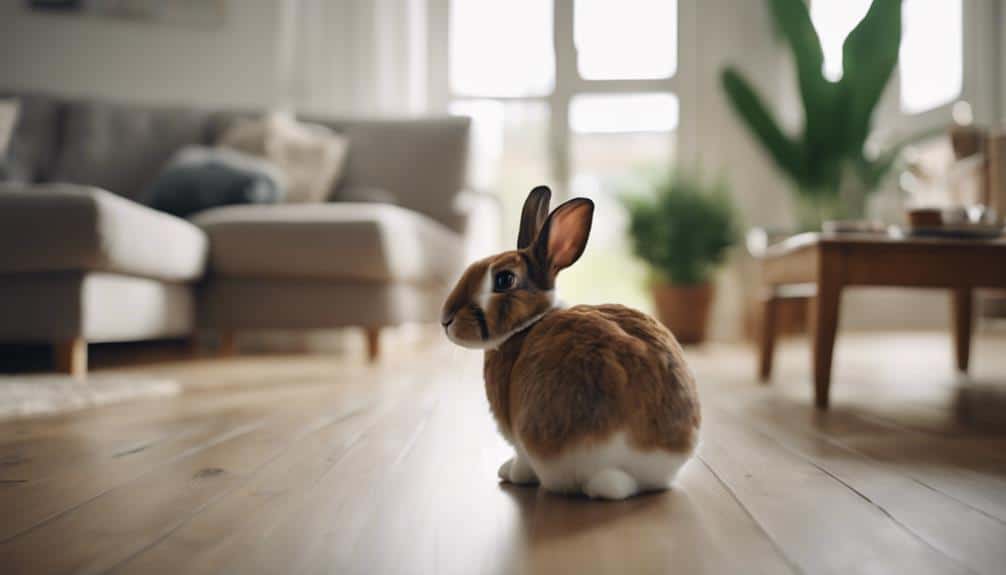
When you're picking a rabbit breed to live in an apartment, it's a good idea to choose smaller breeds that are flexible and social.
Breeds like the Holland Lop, Netherland Dwarf, and Mini Rex are great for apartment living. They're not only small in size, but they're also friendly and love people, making them perfect pets for small living spaces.
The thing is, apartments can be pretty cramped, so you need a breed that can thrive in tight spaces.
Smaller breeds don't need as much room to run around, and they can adapt easily to a cozy home environment. Plus, they're usually quieter and less active than bigger breeds, which is important in an apartment where you need to keep the noise down.
Before you bring a rabbit into your apartment, make sure you rabbit-proof your place to create a safe space for your new pet.
This means securing electrical cords, getting rid of toxic plants, and setting aside a special area for your rabbit to exercise and play.
If you choose the right breed and prep your apartment correctly, you can be sure you and your rabbit will live happily ever after.
Creating a Rabbit-Friendly Environment
Creating a rabbit-friendly environment is all about setting up a dedicated space that includes a safe place to sleep and room for exercise and exploration.
First, you'll want to make sure your apartment has ample space for your rabbit to move around comfortably. A bunny-proofed room or a rabbit cage/condo can serve as a safe area, preventing damage to your property.
This is important because you'll want to keep harmful items out of reach and provide a cozy spot for your rabbit to rest undisturbed.
If you want to give your rabbit some supervised outdoor exploration, consider using portable run enclosures. These can offer a change of scenery and let your rabbit experience different environments.
To maintain a safe environment, think about utilizing vertical space and protecting carpets and baseboards.
Easy-to-clean enclosures and regular cleaning routines are also essential for your rabbit's health and well-being.
Providing Adequate Exercise Opportunities
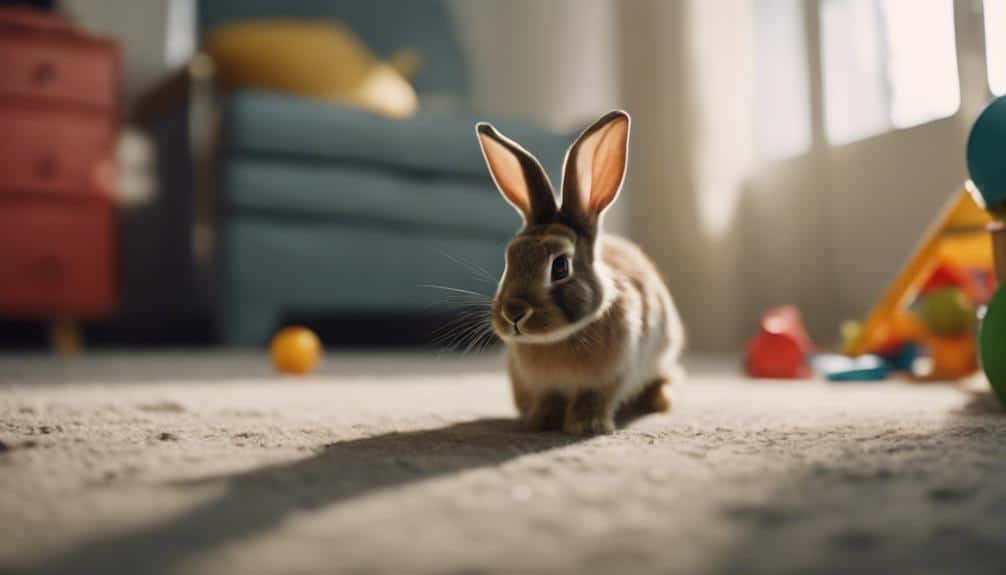
To keep your rabbit healthy and happy, it's crucial to provide them with adequate exercise opportunities outside of their enclosure.
Rabbits need to roam free for at least 3 hours daily to maintain their overall health. This is a must, so make sure you can commit to this before getting a rabbit as a pet.
One way to provide this exercise is to create rabbit-proofed spaces like living rooms or hallways where your rabbit can roam under your supervision. This way, you can ensure their safety while still giving them the freedom they need.
Another option is to use portable run enclosures or playpens. These provide additional space for your rabbit to exercise while keeping them protected from potential dangers.
If you're feeling adventurous, you can even try harness training your rabbit. This allows them to walk on a leash and explore the outdoors with you, all while staying safe.
Importance of Regular Grooming
Regular grooming is super important for your rabbit's health and well-being.
When you brush their fur regularly, you're helping to prevent hairballs from forming. It's also a great way to keep their coat looking healthy and shiny.
Trimming their nails is also crucial. If you don't, they can get too long and cause injuries.
Brushing for Fur Health
Frequent grooming of your rabbit's fur is essential to maintain its health and prevent potential skin issues.
Rabbits need regular grooming to prevent matting and tangling of their fur, which can lead to skin problems. Brushing your rabbit regularly helps to prevent these problems from occurring.
You should brush your rabbit at least once a week. This helps reduce shedding, prevents hairballs, and distributes natural oils for a healthy skin and coat.
The frequency of brushing may vary depending on the breed of your rabbit. For example, long-haired breeds need daily brushing, while short-haired ones may only need it once or twice a week.
Grooming is also an opportunity to inspect your rabbit's fur for any health issues. You can check for fleas, ticks, skin lesions, and other health concerns early on.
This can help you catch any potential problems before they become serious.
Brushing your rabbit can be a calming experience for both you and your pet. It can strengthen the bond between you and your rabbit, promote trust, and reduce stress.
Regular grooming not only keeps your rabbit looking its best but also plays a crucial role in maintaining its overall well-being.
Nail Trimming Tips
Keeping your rabbit's nails trimmed is a crucial part of their regular grooming. If you don't, it can lead to discomfort and health issues. Long nails can cause lameness and arthritis in rabbits.
To keep your rabbit comfortable and healthy, you should trim their nails every 4-6 weeks. The goal is to keep their nails at a length that allows them to move around comfortably. This regular maintenance is necessary to prevent discomfort and health problems.
Trimming your rabbit's nails regularly is essential to prevent overgrowth and maintain their health. Long nails can cause discomfort, lameness, and arthritis, so regular trimming is necessary.
Here's a summary of nail trimming tips:
| Nail Trimming Tips | Description | Importance |
|---|---|---|
| Frequency | Trim your rabbit's nails every 4-6 weeks to prevent overgrowth and maintain their health. | Prevents discomfort |
| Tools | Use nail clippers or a Dremel to trim the nails carefully, avoiding cutting the quick and causing pain. | Ensures safe trimming |
| Technique | Consult with a vet or experienced breeder to learn the proper technique for trimming your rabbit's nails safely. | Prevents injuries |
Rabbit-Proofing Your Apartment
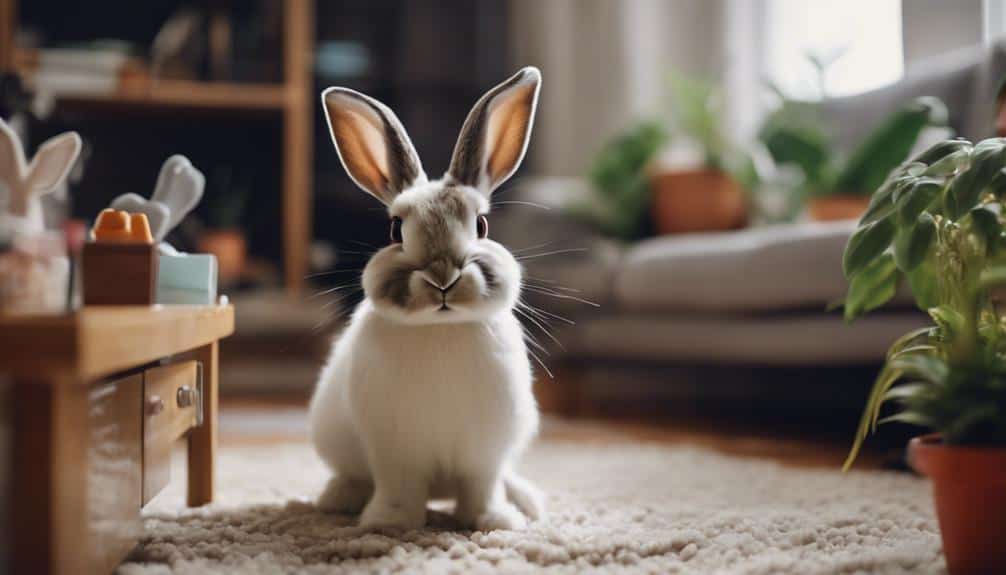
To keep your rabbit safe in your apartment, you need to create safe play areas. This means blocking off spots that could be hazardous to your rabbit. You should also provide plenty of distractions to keep them occupied.
Electrical cords are a major hazard, so you need to protect them. You can use wire coatings or enclosures to prevent your rabbit from chewing on them. This will help prevent electrical hazards and keep your rabbit safe. By taking these precautions, you can ensure your rabbit's safety and prevent damage to your apartment.
Safe Play Areas
Protecting your rabbit's safety in your apartment is crucial, and creating designated safe play areas and rabbit-proofing your living space is a great way to do so.
First, set up a rabbit home base or enclosure at a comfortable height to keep your rabbit secure and relaxed. This will be their safe haven where they can retreat whenever they feel overwhelmed.
Next, prevent wire hazards by covering exposed wires with protective coating and blocking off areas with wires to discourage chewing. Rabbits love to chew, and wires can be a serious hazard if not protected.
Another important step is to protect your walls and furniture. Use baseboard covers to prevent chewing on walls, secure heavy furniture to avoid tipping, and keep toxic substances out of reach.
You don't want your rabbit to get hurt or poisoned accidentally. Keep your apartment clean and clutter-free to eliminate tripping hazards. A cluttered space can lead to accidents that could harm your rabbit, so make sure to tidy up regularly.
Electrical Cord Protection
Protecting your rabbit from electrical cords is crucial to their safety in your apartment. Rabbits love to chew, and electrical cords can be a big temptation for them. This can lead to serious injuries or even fatalities, so it's essential to take protective measures.
When you're setting up your rabbit's living area, keep a close eye on their behavior. If you notice them showing any interest in cords, intervene right away.
One effective way to keep them away from cords is by using bitter apple spray. This spray is safe for your rabbit, but they won't like the taste, which will deter them from chewing on the cords.
Monitoring Rabbit's Health and Behavior
Monitoring your rabbit's health and behavior is super important to catch any potential issues early on.
When it comes to your rabbit's health, there are a few things you should keep an eye on. For instance, if your rabbit's eating habits, bathroom habits, or activity levels change suddenly, it could be a sign of an underlying health issue. You should also pay attention to their overall demeanor – if they seem off or different, it's worth investigating.
Regular trips to the vet are a must to make sure your rabbit is healthy and to catch any potential health problems before they become serious.
It's also important to watch out for any unusual behaviors, such as aggression, excessive hiding, or lethargy. These behaviors can be signs of distress or illness, so if you notice anything out of the ordinary, it's a good idea to consult with a vet.
Providing your rabbit with opportunities for exercise, mental stimulation, and social interaction is also crucial. You can do this by engaging them in supervised outdoor activities, like letting them hop around in a rabbit-proofed area.
Conclusion
So, you want to keep a rabbit in an apartment? That's a great idea, but it's not without its challenges.
Rabbits need space to move around and exercise, and they can get bored and stressed if they don't have enough stimulation. You need to think carefully about whether an apartment is the right place for a rabbit.
You'll need to choose a breed that's suitable for apartment living – some breeds are more laid-back and don't need as much space as others. But if you're willing to put in the effort, you can create a great home for your bunny.
You'll need to rabbit-proof your apartment. Rabbits love to chew, so you'll need to make sure that any wires or hazardous materials are out of reach. You'll also need to set up a safe and comfortable area for your rabbit to live in.
Exercise is also crucial for a happy and healthy rabbit. You'll need to make sure your rabbit gets enough time outside of their cage to run around and play. You can do this by setting up a rabbit-proofed area in your apartment, or by taking your rabbit for walks on a leash.
Regular grooming is another important part of caring for a rabbit. Rabbits need their fur brushed regularly to prevent matting and tangling, and they also need their nails trimmed and their ears cleaned.
Finally, you'll need to keep an eye on your rabbit's health and behavior. Rabbits are prone to certain health problems, such as dental issues and respiratory infections, so you'll need to monitor your rabbit's behavior and watch for any signs of illness.
If you're willing to put in the time and effort, you can have a happy and healthy rabbit in your apartment. Just remember to do your research and be prepared for the challenges that come with caring for a rabbit in a small space.



